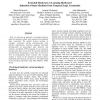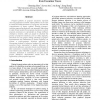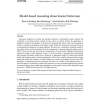64 search results - page 10 / 13 » Modeling self-efficacy in intelligent tutoring systems: An i... |
218
click to vote
EH
1999
IEEE
1999
IEEE
Evolvable Hardware or Learning Hardware? Induction of State Machines from Temporal Logic Constraints
15 years 6 months ago
Here we advocate an approach to learning hardware based on induction of finite state machines from temporal logic constraints. The method involves training on examples, constraint...
106
Voted
ICWL
2007
Springer
15 years 8 months ago
2007
Springer
Intelligent Tutoring Systems have made great strides in recent years. Many of these gains have been achieved for welldefined problems. However, solving ill-defined problems is imp...
164
click to vote
ICTAI
2008
IEEE
15 years 8 months ago
2008
IEEE
Frequent patterns in program executions represent recurring sequences of events. These patterns can be used to reveal the hidden structures of a program, and ease the comprehensio...
PST
2004
15 years 3 months ago
2004
The goal of the semantic web is to facilitate the exchange of meaningful information in a form that is easy for machines to process. The goal of an e-learning system is to support ...
109
click to vote
AI
2000
Springer
15 years 1 months ago
2000
Springer
Automated handling of tutoring and training functions in educational systems requires the availability of articulate domain models. In this article we further develop the applicat...



